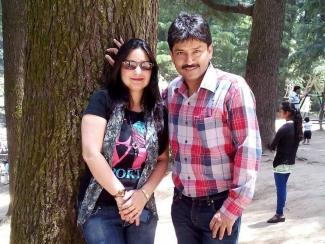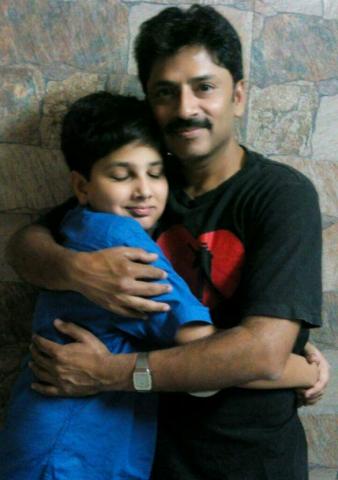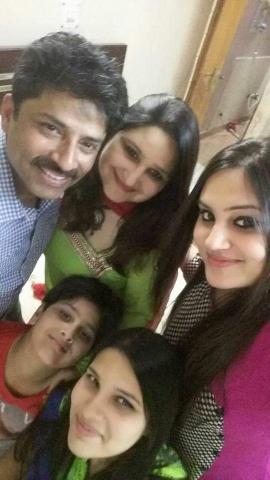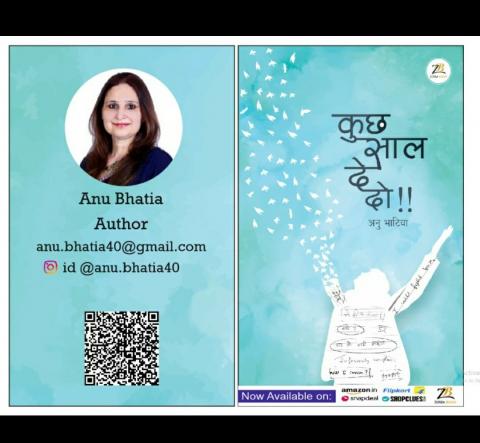
Anu Bhatia, a school teacher, fulfilled her late husband’s wish to write a novel after he lost his voice to cancer of the vocal chords to help those going through similar experiences. Her book sensitively captures the two year’s journey of loss and grief.
In May 2016, I had taken a bunch of kids on a school trip to Germany. As my husband was not there with me, I would call him every night before going to sleep and rhapsodise about the places I had visited. He would laugh and share my excitement. One day, closer to the end of my 15-day trip, when I called him, he sounded extremely quiet and subdued, not his usual bubbly self. He had not tagged any of my pictures, nor gushed about my DP. I was surprised. I asked him if he was not feeling well, but he quickly changed the conversation. It was only when I returned that I got to know that he had been diagnosed with cancer of the vocal chords. I was horrified.
Early symptoms
His throat problem had started several months before. He would complain about some discomfort, particularly pressure and pain while talking. We visited many doctors, including a Ear-Nose-Throat (ENT) Specialists, followed up with X-rays, but most of them concluded that they could only notice a swelling in the larynx. As my husband was a non-smoker, teetotaller and extremely conscious about his health, they linked it to over exertion of the throat from constant speaking. He was a professor of mathematics teaching for 21 years. He ran a Maths Coaching Centre for higher classes and entrance exams, which required him to speak continuously through the day. But it is nothing serious, they said, nothing to worry. Probably some rest and speech therapy would help. My husband took a break and went to resort in Shimla to meditate, maintain silence, and ease this throat. But even after a week, his uneasiness persisted. We continued in the false hope that with time and rest, the swelling would subside.
So, when he was detected with cancer we were all shocked. The report indicated that his cancer had advanced critically and had reached last stage. A laryngectomy (removal of voice box, or larynx) surgery was required. The diagnosis struck him hard. It meant he would not be able to speak anymore. He appeared crushed. He was just not able to reconcile living without his voice. He was exceedingly passionate about his job and loved teaching and interacting with his students. Being very vocal and social, he was always full of stories about his experiences and long innings. To lose one’s voice can be one of the most traumatic experiences for anyone, but for my husband it hit him like deathblow.
Turning to Naturopathy
Therefore, when one his relatives suggested he try naturopathy which could prevent operation and loss of voice, he agreed most willingly. For two and a half months after diagnosis of cancer, he desperately hoped alternative medicines would heal him.
One day in August, in the midst of naturopathy treatment, his breathing stopped and he had to be rushed to the hospital. An MRI showed that the size of the tumour had increased. The cancer cells had multiplied aggressively. Laryngectomy seemed absolutely critical now. But my husband was still adamant.
Then we came across Dr Surender Dabas, a head and neck surgical oncologist. He was very gentle and human person. Overtime he became our family friend. He sat down with my husband and talked with him for quite some time. He gradually made him realise the importance of surgery to save his life. After many sessions with the doctor, my husband finally accepted his fate. While driving back home he suddenly blurted out: ‘So what if I am not able to speak. We will lead a normal life. I will write a novel to tell people that life is beautiful, whatever we have, we have to live with full zeal.’ I could sense that he was desperately fighting back his tears. His hands were trembling and he appeared extremely nervous.
Total laryngectomy
In August he underwent radical laryngectomy. In an 8 hour surgery his vocal cords were removed along with 16 nodules. They punctured his neck (a Tracheo oesophageal puncture - TEP) to allow food and breathing. There was complete separation of the airway from the mouth, nose and esophagus now. The doctor informed me that Anshu’s cancer cells were rare though dangerous.
After surgery, they decided on 30 radiation cycle. The first day when he went for radiation, he entered the radiation centre and when he saw the darkened faces of people (effect of radiation), he was aghast. He was reluctant to get radiation. After five rounds of radiation he developed boils and leakage in his food pipe. They had to stop radiation. A nasogastric tube or nasal food pipe had to inserted for a sometime.
A month after his surgery, my husband was eager to start speech therapy. In the absence of his voice, he would text me or write down notes. He was extremely fond of our son, Kabir, and would teach him maths with great passion. Once he jotted down, ‘I am a maths teacher. I have taught thousands of students. I am eager to get back to teaching, at least I can resume teaching my son.’ He was restless to teach Kabir. But his pipe had not healed, and there was no way the doctor was going to allow any speech therapy to begin.
PET Scan
Six months after laryngectomy, the doctor recommended a PET scan to ensure we he was cancer free. It was supposed to be just a formality, because it was expected there would be no trace of cancer in my husband now, as most people recover completely. My husband and I were hoping that this would be the end of our bad times and we would begin life anew. We would be with our three children, two daughters and a son, who were also deeply impacted by their father’s tragedy, and probably plan a nice family getaway.
But we had no such fortune. The PET images indicated cancerous lesions in the right lung. We couldn’t believe what was happening. I was in absolute shock. The doctor said it was a case of lung metastasis cancer i.e tumour from the larynx had spread to the lungs. He added that cancer cells lodged in the lungs were high grade tumour cells which are dangerously aggressive.
This was one of the worst news that we could expect. The doctor called me to the clinic and informed me that my husband has little time left, maybe not more than 6 months. I couldn’t breathe after that and fainted. My mind had become blank and my body was breaking. I began to howl before the doctor. It was suggested that I do not disclose the threat to his life, but work keeping his morale high. I dragged myself home in a stupor, and was agonised to face my husband. I could not tell anybody, not even my children about the prognosis. It was getting unbearable and killing me inside everyday. As a wife, I had to keep hoping and praying that some miracle would save him.
Battling lung metastasis
The doctor suggested we do a FNAC (fine needle aspiration cytology) to sample and diagnose tumour in the lung. Chemotherapy was suggested to extend his life for some time. After 8 cycles of chemo and several rounds of immunotherapy, there was no improvement. The tumour had grown uncontrollably and covered almost his entire lung.
As a wife and caregiver, I tried everything to save my husband. Every time I felt I was breaking down, I would quickly rush to the other room so that my husband would not see me crying. I could feel fatigue wrecking me emotionally and psychologically I was beginning to feel like a broken women. The only place where I would get some spare time was the school. I was teaching Hindi to the senior school students. It helped me from falling apart and gave my financial security. When chemo and immunotherapy were being administered during the last stage, I was incurring a bill of nearly Rs 5 lakh per month. I was deseperately tapping all sources to raise funds.
My husband’s treatment was very intensive, painful and prolonged. He passed away on March 1, 2018 struggling for his life at age 49.

Impact on family
Kabir was teenager and impressionable when his father was first diagnosed with cancer. When his father lost his voice, his closest mentor, teacher, Dad was snatched away from him. He watched his role model, deteriorate and die. He was quite traumatised. I, too, like Kabir was spiralling out of control. I was not able to eat much and would faint many times. It was on the fourth day after the tragedy that Kabir held me tight and cried, his first breakdown. That really affected me. I began to pull myself together from that day. I realised that I had to be strong for my kids. My kids are my responsibility. I have to look after them. They have lost one parent, I didn’t want them to lose both.
My daughters were older. They handled the illness and loss with amazing maturity. Infact they were a huge source of strength and stability.

Reposing confidence in your doctor
One thing I learnt from my experience is that in a patient’s journey, treatment and medicines is not everything. It is the support of the doctor and the family which is highly crucial. It is very important to keep the patient in a positive and happy frame of mind. I realised that I was able to spend a few months more with my husband because of the circle of love we surrounded him in.
Novel on him
My husband was keen to write a book about his trails and struggles, especially after losing his voice. He would communicate with us by writing. I have around 40 registers of his notes, where he wrote down his feelings and experiences. It was 3 years after his death that I was able to fulfil his dream. I wrote the novel inspired by his two year journey of cancer. I referred to his copious records to write the novel. I have written the book with emotions not with words. Whoever has read the book, said it is like watching a film. The scenes come alive. I have titled the book after a phrase he would often repeat ‘Kuchh Saal De Do.’, pleading for a few more years of his life to be able to pass on the love for maths to his son, till his graduation at least. The book was launched on November 10, 2021 by the doctor who steadfastly stood by him from diagnosis to death, Dr Surender Dabas.
Link to the novel Kuchh Saal De Do –







